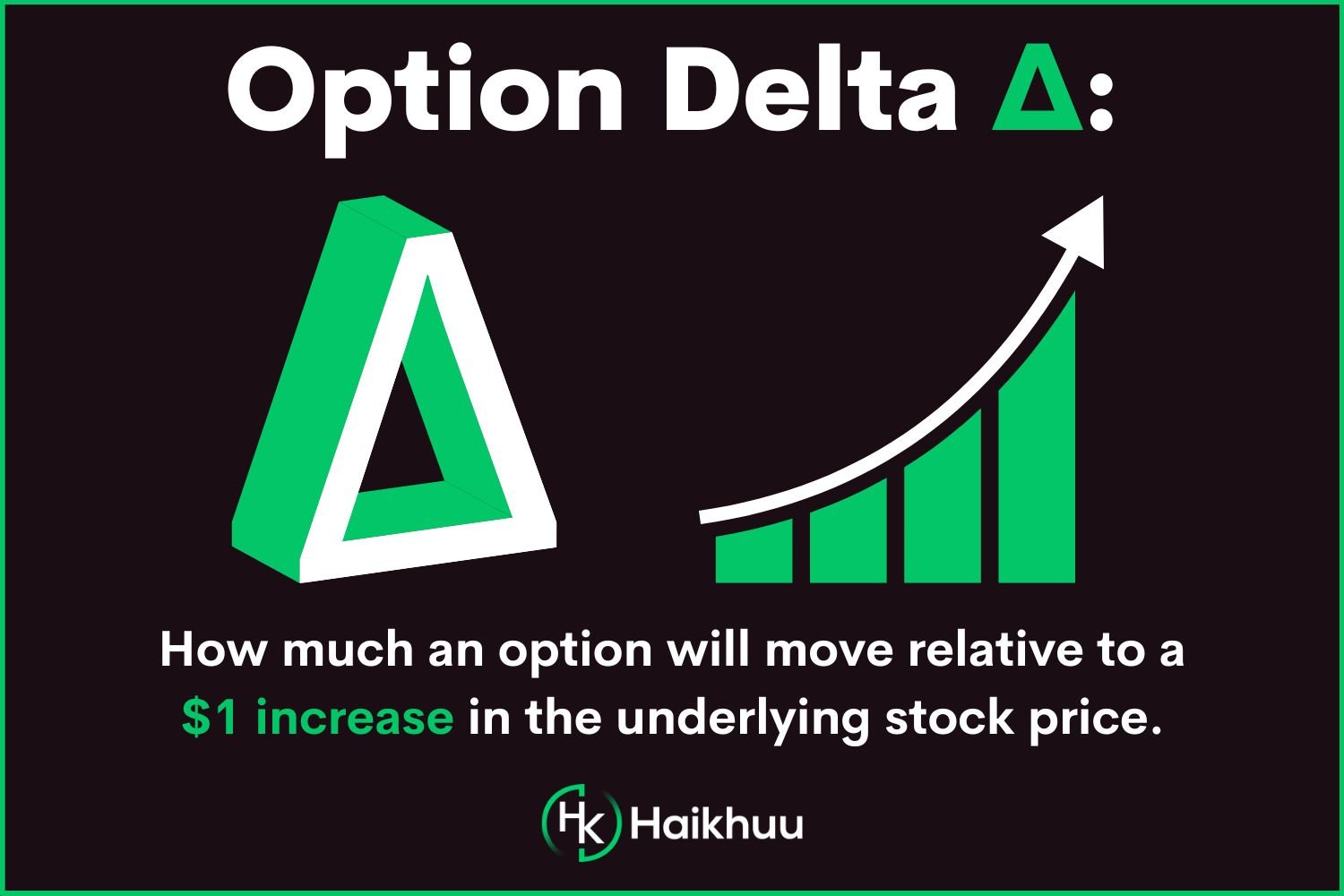Option Delta Formula, Meaning, and Calculation Explained
What is Option Delta
Delta is one of the options greeks that has multiple definitions.
The first definition of delta is the percent chance an option will expire ITM. For example, if an option has a delta of 50, there is a 50% chance the option will expire ITM. This is true regardless if its positive or negative.
The next definition is how much an option will move relative to a $1 increase in the underlying stock price. For example, if you own a call option with a delta of 50, and the stock price moves up $1, your call option will move up $0.50.
Understanding Delta
Options traders may also view delta as the amount of shares a particular contract commands. For example, if you buy a call option with a delta of 70, at that moment, you are commanding 70 shares of stock.
The option delta will also change as the market moves since options have a dynamic delta while shares of stock are always delta 1. For example, if you have a call with a delta of 70, and the stock moves up $1, your option will move up by $0.70. The option delta will also increase since it is going further ITM in this example.
Position Delta
Position delta refers to the delta values of your current positions. Generally, this is useful when employing strategies like the married put.
Say you own 200 shares of stock, this means your position delta is 200. If you want to neutralize this position completely, you can buy put options, creating a married put.
If you wanted to hedge an entire 100 share lot, you could buy two put options with a delta of 50, adding up to 100 deltas. Therefore, your new overall position delta including shares and the put options is 100 since you hedged the other 100 deltas with put options.
Long vs. Short Options and Delta
If you look at delta on the option chain, you will notice put options have a negative delta and calls have a positive delta. Of course, if your position delta is positive, you are bullish, and if it is negative, you benefit from bearish moves. However, your position delta will differ whether you bought or sold the option.
Put Option Delta
If you buy a put option, your delta will be negative since you benefit from a move down in the stock price. If you sell a put option, your position delta is positive since you benefit from an increase in the stock price.
Call Option Delta
When you buy a call option, your position delta is positive, as this is a bullish play. However, when you sell a call option, your position delta is negative since it is a bearish play.
Option Delta Formula
Delta is a measure of the sensitivity of an option’s price to changes in the price of the underlying asset. There are two commonly used formulas for calculating delta. The first is a general formula that can be used to calculate the delta of any option:
Delta = (Of - Oi) / (Sf - Si) where Of is the final value of the option, Oi is the initial value of the option, Sf is the final value of the underlying stock, and Si is the initial value of the underlying stock.
The second formula is based on the Black-Scholes model, which is a widely used model for pricing European options. According to this model, the delta of a call option is calculated as N(d1), where N is the cumulative standard normal distribution function and d1 is given by the Black-Scholes formula.
For a put option, the delta is calculated as: N(d1) - 1.
How to Calculate Option Delta
To calculate delta using the general formula, you will need to know the initial and final values of both the option and its underlying stock. Simply plug these values into the formula Delta = (Of - Oi) / (Sf - Si) to calculate delta.
To calculate delta using the Black-Scholes model, you will need to know the current price of the underlying asset, the strike price of the option, the time until expiration, the risk-free interest rate, and the volatility of the underlying asset. These values are used to calculate d1, which is then plugged into the formula for delta.
Option Delta Calculators
There are many online calculators available that can help you calculate delta. Some popular options include:
The Options Industry Council’s Options Calculator: https://www.optionseducation.org/toolsoptionquotes/optionscalculator
The Cboe Options Calculator: https://www.cboe.com/education/tools/options-calculator/
These calculators typically require you to input information about the option and its underlying asset, such as current price, strike price, time until expiration, interest rate, and volatility. Once you have entered this information, the calculator will use either a general formula or a specific pricing model (such as Black-Scholes) to calculate delta.

